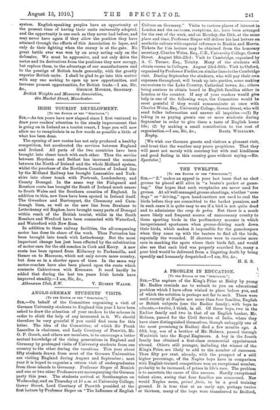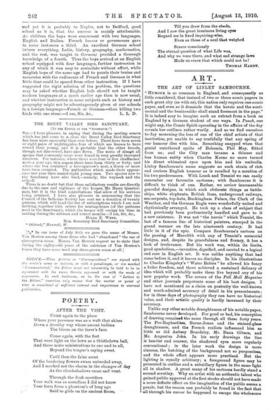A PROBLEM IN EDUCATION.
[To THE ELOILOIC OF THE " SPECTATOR.".1 SIR,—The capture of the King's Prize at Bisley by young' Mr. Radice reminds me to submit to you an educational problem which I have often wished to place before you, and of which the solution is perhaps not far to seek. There were until recently at Naples not more than four families, English or British subjects (one the Radice family), with boys to educate,—twelve, I think, in all. Of these boys, two in the Radice family and two in that of an English banker, Mr. Holmes, passed for the Civil Service of India, where they have since distinguished themselves, though unhappily one of the most promising (a Radice) died a few months ago. A fifth boy, son of a brother of Mr. Holmes, passed through Woolwich into the Royal Engineers. A boy in the fourth family has obtained a first-class commercial appointment abroad. Others still younger, including the winner of the King's Prize, are likely to add to the, number of successes. Thus fifty per cent. already, with the prospect of a still higher percentage, of the Naples boys have in comparison with English-trained competitors won an exceptional number, probably to be increased, of prizes in life's race. The problem is to ascertain the cause of this success. Hardly exceptional talent alone, seeing that four families are concerned. Nor would Naples seem, prima facie, to be a good training ground. It is true that at an early age, perhaps twelve or thirteen, many of the boys were transferred to Bedford, 'and yet it is probably to Naples, not to Bedford, good school as it is, that the success is mainly attributable. AS children the boys were conversant with two languages. English and Italian. French bonnes or governesses gave in some instances a third. An excellent German school '(*here everything, Latin, history, geography, mathematics, and the rest, was taught in German) provided a thorough knowledge of a fourth. Thus the boys arrived at an English school equipped with four languages, further instruction in Any of which it was easy to assimilate without effort, while Mnglish boys of the same age had to puzzle their brains and -.memories with the rudiments of French and German in what little time could be spared from other instruction. If I have .suggested the right solution of the problem, the questions may be asked whether English lads should not be taught modern languages at a much earlier age than is now usual, and whether instruction in sonic subjects such as history and geography might not be advantageously given at our schools in a foreign language—French or German—thus killing two .birds with one stone.—I am, Sir, &c., L. L. D.







































 Previous page
Previous page